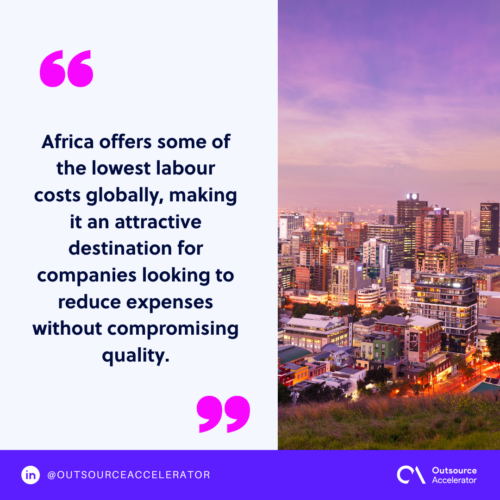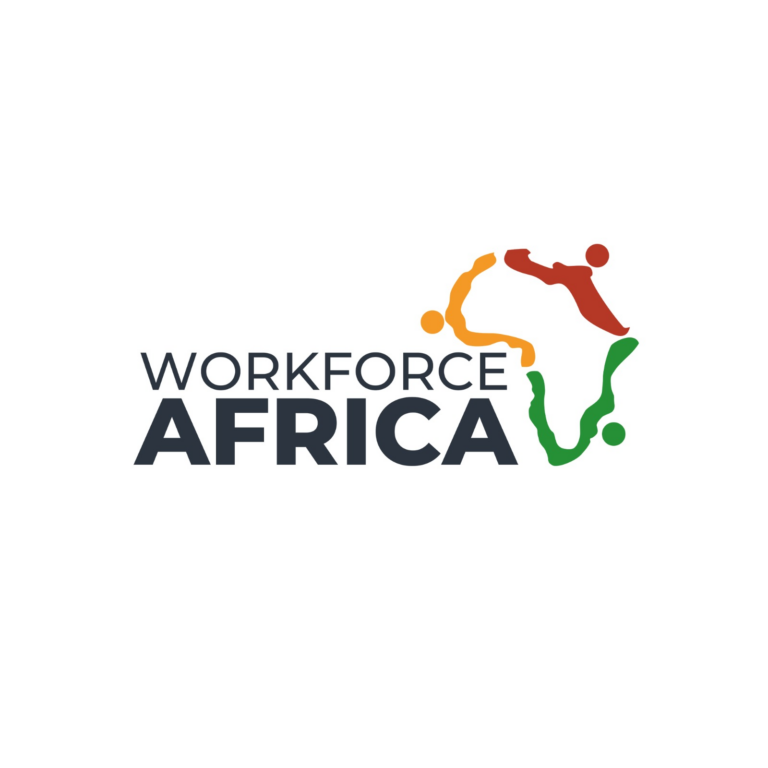Offshoring to Africa: The global strategy to maximize business efficiency

This article is a submission by Workforce Africa. Workforce Africa specializes in managed teams, offering professional, innovative, and comprehensive solutions for African expansion and talent needs.
In today’s highly competitive global marketplace, businesses are under constant pressure to reduce costs, enhance efficiency, and maintain a competitive edge.
One strategy that has gained significant traction is offshoring, a practice where companies transfer business processes to another country to take advantage of lower labour and operational costs.
Africa is increasingly emerging as a key offshoring destination, offering a skilled workforce, cost savings, and growing technological infrastructure.
What is offshoring?
Offshoring refers to the relocation of services, production, or business processes to a different country. Unlike simple outsourcing, which can occur domestically, offshoring specifically involves shifting operations to a foreign location while still maintaining control over the process.
This allows businesses to benefit from international expertise and cost advantages while ensuring operational oversight.

Key differences between offshoring and outsourcing
While typically used in the same breath, there are some notable differences between offshoring and outsourcing:
- Location: Offshoring specifically refers to moving operations to another country, whereas outsourcing can occur domestically or internationally.
- Ownership: Offshoring means that the company retains ownership and management of the process. In contrast, outsourcing involves transferring the responsibility to a third-party vendor who manages the task independently.
The 4 primary offshoring models
There are four primary models businesses use when offshoring, each with distinct advantages and challenges:
1. Independent contractors
Hiring overseas freelancers or independent contractors provides flexibility and reduces risks. This model is ideal for short-term or specialized projects that do not require a full-time team.
2. Captive centers
Companies establish their offshore branches or subsidiaries, known as captive centers.
This model offers complete control over operations and data security but requires significant investment in infrastructure and local compliance.
3. Joint ventures
Partnering with a local company to create a separate legal entity enables businesses to share risks and startup costs. However, the downside is that it can limit control over the operation.
4. Outsourcing partners
Businesses contract offshore service providers to handle specific functions. This provides immediate access to skilled professionals and established infrastructure, reducing setup costs.
Choosing the right model depends on a company’s strategic objectives, operational requirements, and risk tolerance.
What are the benefits of offshoring?
Companies engage in offshoring for several compelling reasons:
- Cost savings: Offshoring to developing nations can reduce operational costs by 30–50% due to lower labor and infrastructure expenses.
- Scalability: Companies can easily scale operations up or down based on business needs without the long hiring processes associated with full-time staff.
- Enhanced productivity: Operating across different time zones enables round-the-clock workflows, increasing overall efficiency.
- Access to skilled talent: Offshoring provides access to a vast pool of highly educated professionals in diverse industries, from IT and finance to engineering and customer service.
- Business expansion: Establishing an offshore presence helps companies expand their market reach and increase global revenues.
- Focus on core competencies: By offshoring non-core functions, businesses can focus their resources on strategic growth and innovation.
What business functions are commonly offshored?
Many business functions are suitable for offshoring, particularly those that can be digitized or handled remotely.
Some of the most commonly offshored functions include:
- IT services: Software development, system maintenance, and technical support.
- Back-office operations: Data entry, billing, payroll processing, and virtual assistance.
- Customer support: Call centers, technical assistance, and help desk services.
- Creative and marketing services: Graphic design, content writing, animation, and digital marketing.
- Financial services: Treasury operations, accounting, bookkeeping, and audit support.
- Legal services: Document review, litigation support, and contract management.
- Analytics and data processing: Statistical analysis, business intelligence, and research.
Popular offshoring destinations
Popular offshore locations include:
- The Philippines is a significant hub for back-office business processing and customer service.
- Nigeria is an emerging destination in Africa with solid skills in customer service, accounting, back-office digital marketing, and cost-effective skilled labor.
- India – Known for a highly-educated workforce specializing in IT, software development, and call centers.
- China – Strong in manufacturing and engineering services with a vast talent pool.
- Mexico – Due to sharing a time zone with US companies, it’s a frequent nearshore option.
- Poland – Skilled technology and analytical talent, as well as a rising destination for European companies.
Each location has unique strengths, so companies should analyze their needs and each country’s capabilities.
Why Africa is the next big offshoring destination
While traditional offshoring hubs like India and the Philippines have dominated the industry, Africa is now emerging as a leading offshoring destination due to several key factors:
1. Competitive labour costs
Africa offers some of the lowest labour costs globally, making it an attractive destination for companies looking to reduce expenses without compromising quality.
Countries such as Nigeria, Kenya, and Egypt provide highly skilled workers at a fraction of the cost compared to Western markets.

2. Growing skilled workforce
The continent is home to a rapidly growing, educated workforce, particularly in fields such as IT, finance, customer support, and engineering. Many African nations have strong university systems producing graduates with in-demand skills.
3. Language proficiency
Several African countries, including Nigeria, Kenya, Ghana, and South Africa, have a high level of English proficiency, making them ideal for serving global markets. French-speaking countries like Morocco and Senegal cater to European businesses needing bilingual services.
4. Digital and technological advancements
Africa’s digital economy is expanding, with major investments in tech infrastructure, internet connectivity, and fintech innovations.
Countries like Kenya (dubbed the ‘Silicon Savannah’) and South Africa are developing robust ICT ecosystems that support global business operations.
5. Time zone advantage
Africa’s time zones align closely with Europe and overlap with the United States, making it easier for businesses to maintain real-time communication with offshore teams.
6. Government support and business incentives
Many African governments are actively promoting foreign investment in the offshoring sector by offering tax incentives, investment-friendly policies, and business-friendly regulatory frameworks.
Top offshoring destinations in Africa
While several African nations are positioning themselves as offshoring hubs, the following countries stand out:
- Nigeria: Known for its large, tech-savvy workforce, Nigeria is a growing hub for IT outsourcing, customer service, accounting, and digital marketing.
- Kenya: Emerging as a key player in business process outsourcing (BPO) and IT services, with strong government support.
- South Africa: Boasts a well-developed infrastructure and a high level of English proficiency, making it ideal for customer support and financial services.
- Egypt: A leading destination for IT and customer service outsourcing, with a bilingual workforce fluent in Arabic and English.
- Ghana: Offers competitive labour costs and a stable business environment for offshoring operations.
How to implement a successful offshoring strategy
To successfully offshore operations and maximize efficiency, businesses should consider the following steps:
- Define objectives. Clearly outline what functions to offshore and the expected benefits.
- Choose the right model. Assess whether independent contracting, a captive center, joint venture, or outsourcing partner best suits the company’s needs.
- Conduct market research. Evaluate different offshoring destinations based on talent availability, cost, legal framework, and infrastructure.
- Select the right partner: When outsourcing, choose a reliable offshore service provider with a proven track record.
- Ensure effective communication. Maintain clear and consistent communication with offshore teams to align objectives.
- Invest in training and development. Provide training to ensure offshore employees meet quality and performance standards.
- Establish a governance framework. Implement oversight measures to monitor productivity, compliance, and quality control.
- Plan for hidden costs. Account for expenses such as travel, technology infrastructure, legal fees, and compliance costs.
Consider offshoring to Africa now!
Offshoring is no longer just a cost-cutting measure—it is a strategic approach to enhancing efficiency, accessing global talent, and driving business growth. As Africa continues to develop its infrastructure, education system, and technological capabilities, it is poised to become a premier offshoring destination for companies worldwide.
Businesses that strategically leverage Africa’s emerging markets can benefit from reduced costs, enhanced scalability, and a competitive advantage in today’s global economy.
With the right approach, offshoring to Africa can be a game-changer for organizations looking to optimize operations and achieve long-term success.







 Independent
Independent




